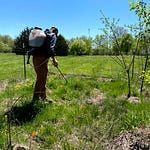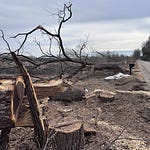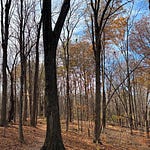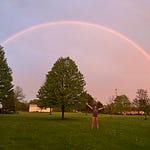This is the newsletter version of Sara by the Season, where I explore what is piquing my curiosity as I try to lean into nature’s wisdom and rhythms. You can listen to me read you the newsletter by hitting play above - or you can click the little link above and to the right to play in your favorite podcast player. The timing is a bit off for this newsletter - I planned to send it two weeks ago, but really needed to write about our corner instead. But it was 22 and flurrying where I am today, so maybe midwintering is sticking around.
If you know someone who would like this sort of thing, I’d be so grateful if you would share it.
If we break down the year into microseasons specific to our place and experience, what is February? I heard a friend say “it’s seed catalog time.” I loved that. Mid-winter isn’t for planting the seeds; it’s time for looking at them in shiny catalogs and having big dreams. So often, even if we do set aside the time for daydreaming (which who does?), we quickly poo-poo our own dreams with rationalizations about money, time, our lack of expertise, etc.
But when I look at seed catalogs, at least at first, I am not thinking about the size of my garden, or the fact that I have an actual day job and two kids with busy schedules. I am thinking about how cool it would be to grow seven different varieties of heirloom cabbage, but then what kind of netting I would need to buy because the cabbage moths always get into my cabbage. I’m not thinking about how we hope to take a family road trip this summer, that our oldest is starting high school and the summer school and training that comes with that - all of which will get in the way of gardening. I am thinking about how excited I am to get my hands back in the soil and how I’m going to build some new beds this year and early mornings with Wendell out there weeding.
What if we treated midwinter like I treat seed catalog time? Instead of immediately moving to rationalizing mode, we made midwinter a dreaming time. Spring is stirring, for sure, but much of the action is going on underneath the earth or mysteriously out in the ether in ways we don’t understand. Like how do the birds know when to return? When to start singing again? It feels like there is so much to learn that I don’t know or maybe we can’t know, and that is almost definitely better and cooler.
If midwinter is for dreaming without restriction, what kinds of questions could we ask ourselves to get to our biggest dreams? So many of us are so stuck in our own schedules and patterns - begrudgingly wake up with the alarm, do something to take care of our bodies if we’re lucky, get kids to school, go to work, take kids to activities, figure out when/if all of us are home in a 20 minute block and how to get dinner on the table at exactly the right time so we can all sit down and enjoy it together, maybe hang out with your partner for a bit if you have one, sneak in some reading before bed, fall blissfully asleep, only to start the whole thing over again the next day. I certainly don’t make time for dreaming - it comes in fits and starts in the shower or those moments I linger in bed after the alarm goes off or always when I get in a hike by myself.
In my Seminary of the Wild cohort, we spent a lot of time sharing and interpreting our dreams. I have never done that before, and I don’t typically remember my dreams so I thought it would be terrible. But the mysterious thing is that, once you open yourself to the idea that your dreams could be communicating something important to you like so many of our ancestors did for most of human history, you start remembering your dreams. Or maybe I started having more dreams? I don’t know, and I can’t be sure which came first. But now I have a “dream notebook” by my bed and I even bought myself a pen with a light on it so I can jot down a few notes after a dream without waking up Grant.
If our sleeping dreams are communicating with us, then certainly our waking ones when we let ourselves really go are telling us something important about our desires. I have this theory that desire is a really important clue for us to pay attention to while we’re here. Many of us, especially women, get hung up on seeing our desire as bad because of patriarchy and fundamentalist religions that tell us if we think too much about our own desires that we’ll fall off the rails or we’ll be self-obsessed buffoons. And that might be true for our wants1. I want to eat candy conversation hearts all day every day in February, but I have to go deeper to find what I desire. I have to be vulnerable, if only with myself.
There is this idea in Traditional Chinese Medicine that the trouble happens when things get out of balance. The winter season is associated with fear. TCM tells us that trouble arises when we have an excess of fear, but also when we don’t experience any fear at all. The goal isn’t to rid ourselves of fear entirely; it’s to right-size it. It’s to be able to live with it, to see it as our teacher. As Liz Gilbert says - to let fear have a seat in the car but not to let it drive the car.
The same is true for our desires. The problem isn’t with desire itself. It’s when we either deny our desires, or when we let them get out of whack in the other direction and let them drive the car. We want to right-size our desires, but so many of us have ignored them for so long that we can’t even figure out what we want anymore.
I was in a writing workshop a few months ago, and we all were nature writers, so I thought there would be a ton of overlap in what we wanted to write about. But everyone had different, fascinating things that they desired to write about. I wanted to read all of their books based just on the short ideas they shared. There is enough room for all of our ideas, and all of our ideas are needed. This diversity of thought is what is produced when we pay attention to our desires.
If midwinter is for dreaming, how can we give ourselves the space and time to check in and see what we desire? If time and money were no option, what would we go after? How would we spend our days?
I believe there is Something2 that put us here in this specific time and place. It might sound naive, and I don’t really care about all of the particulars. If there is a Creator, certainly they wouldn’t have given us this capacity for desire without it serving some higher purpose? And wouldn’t it be a slap in the face to sleepwalk through our lives doing what is expected of us or what everyone else is doing instead of pursuing our own, particular desires?
Scattering Seeds
I’m always finding stuff that supports the thesis of the book I’m writing on the benefits of leaning into nature’s wisdom, as well as other things related to this newsletter’s topic that maybe didn’t fit into the actual newsletter, so I thought I could start sharing those links and things here with all of you in hopes of some of the seeds I share germinating into something beautiful at your place.
I’ve been thinking about desire as messenger for a long time. I think my favorite take on it that I’ve read is Andreas Weber’s beautiful Matter and Desire. A more recent exploration of it was in
’s On Our Best Behavior (and I think she should write her next book just on women’s desire). She writes, “the goal is not to numb ourselves through overindulgence and not to sever ourselves from desire. The path to connection is balance, the middle: being aware of our wants and needs and acknowledging, modulating, and meeting them while being conscious of the wants and needs of others. If we can come into balance within ourselves, we can come into balance in the world. This is the feeling I crave, the freedom I want to create for myself.” Yessss please.I recently finished Cynthia Bourgeault’s very heady Eye of the Heart. In it, she talks about the imaginal realm. We associate the imaginal with imagination, but she says that isn’t really accurate. Instead, she says we should think of it like mystical Islamic texts do: “direct perception through the eye of the heart, not through mental reflection or fantasy.” Bourgeault, in setting up the entire premise of her book, urges readers not to equate imaginal with imaginary. She writes that imaginal “designates a sphere that is not less real but more real than our so-called ‘objective reality’ and whose generative energy can (and does) change the course of the events in this world.” If she’s right, then our dreams and desires have more power than we know. If you want to chase this rabbit hole, get the book or you can start with this series on her blog.
Imbolc is traditional celebrated at the actual midwinter mark - halfway between the winter solstice and spring equinox. It’s become one of my favorite holidays, and I wrote about here.
Here’s to dreaming and desiring season,
Sara
But really my other theory is that it is very difficult to control people who are going after their heart-felt desires, and fundamentalists of any stripe can’t have that. So instead, let’s brainwash people to think that it is their desires that are inherently bad and cannot be trusted as a means of keeping them under our thumb. It’s pretty genius, really.
I call her God, but I don’t think she really cares what you call her. Source, Divine, Ground of Being, Creator. It’s like my kids: they have different names for me, and I don’t mind which name they call me (well, mostly), so long as they’re talking to me.














Share this post